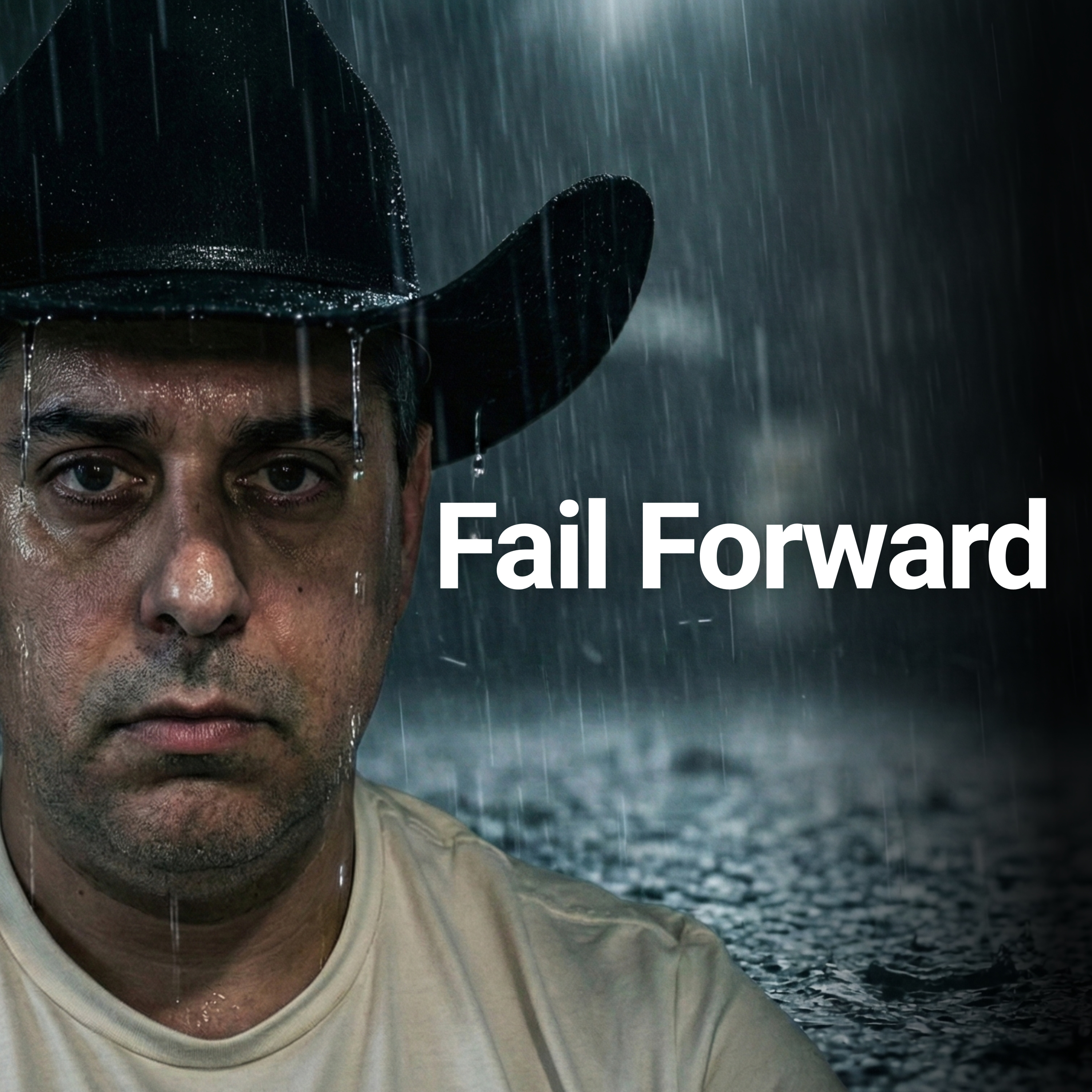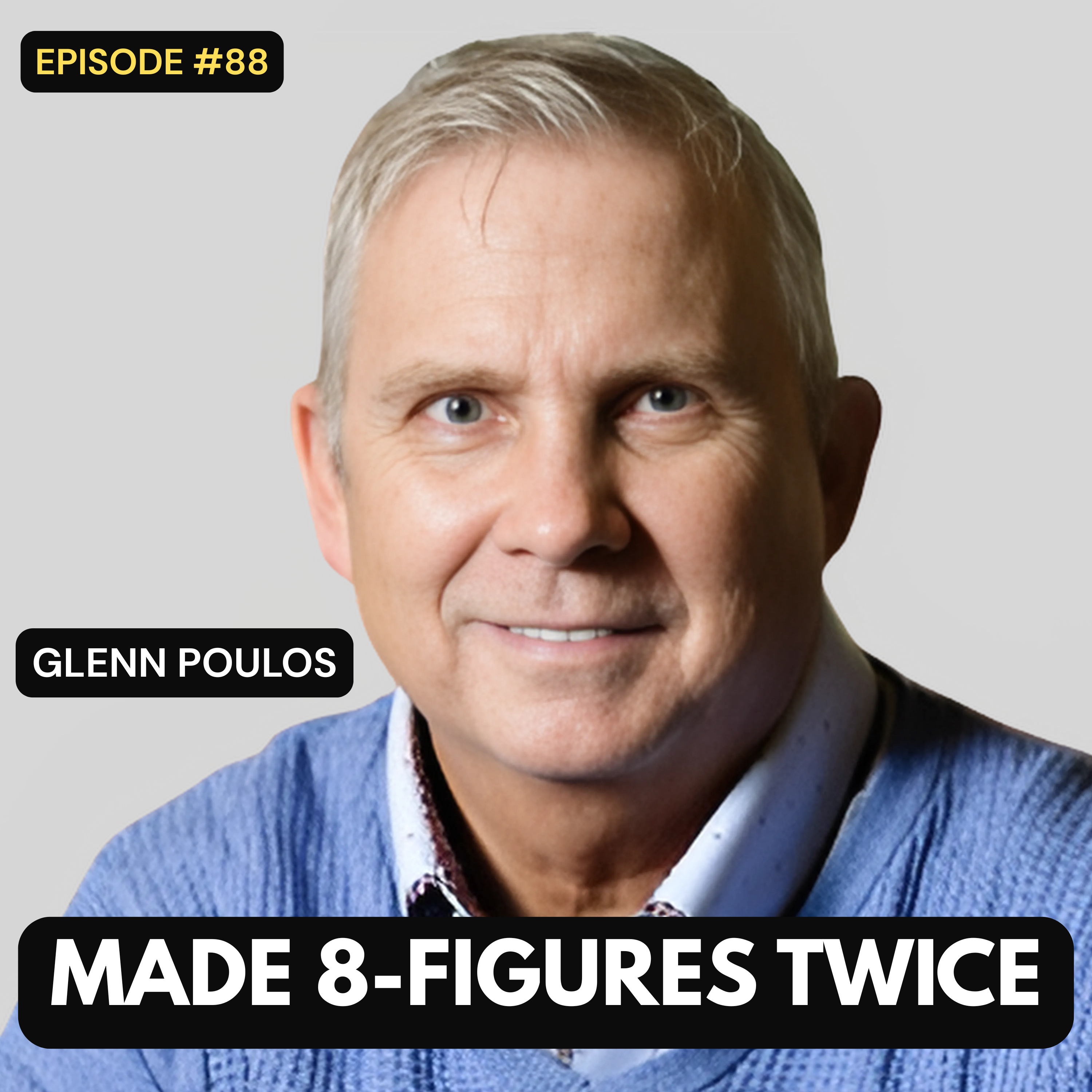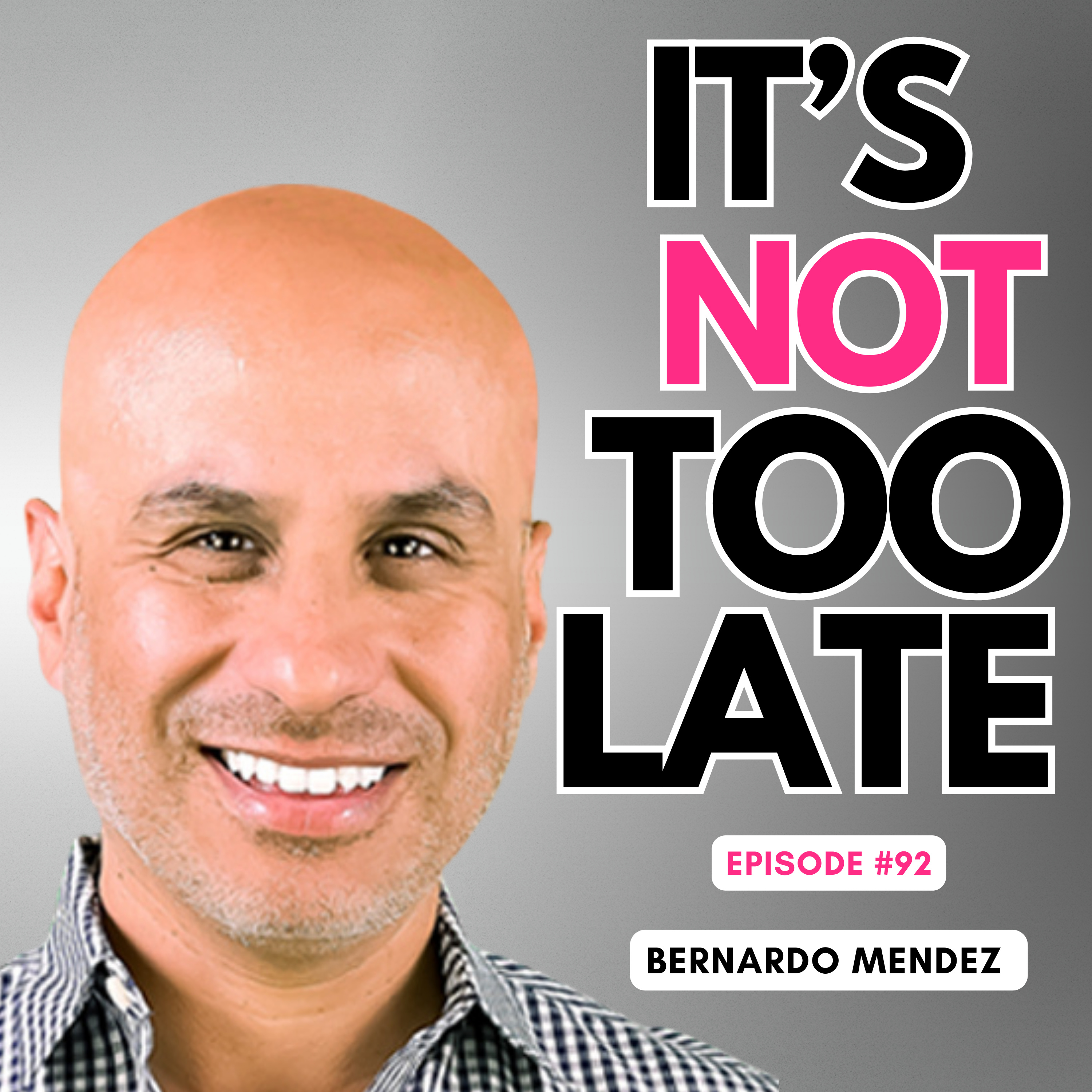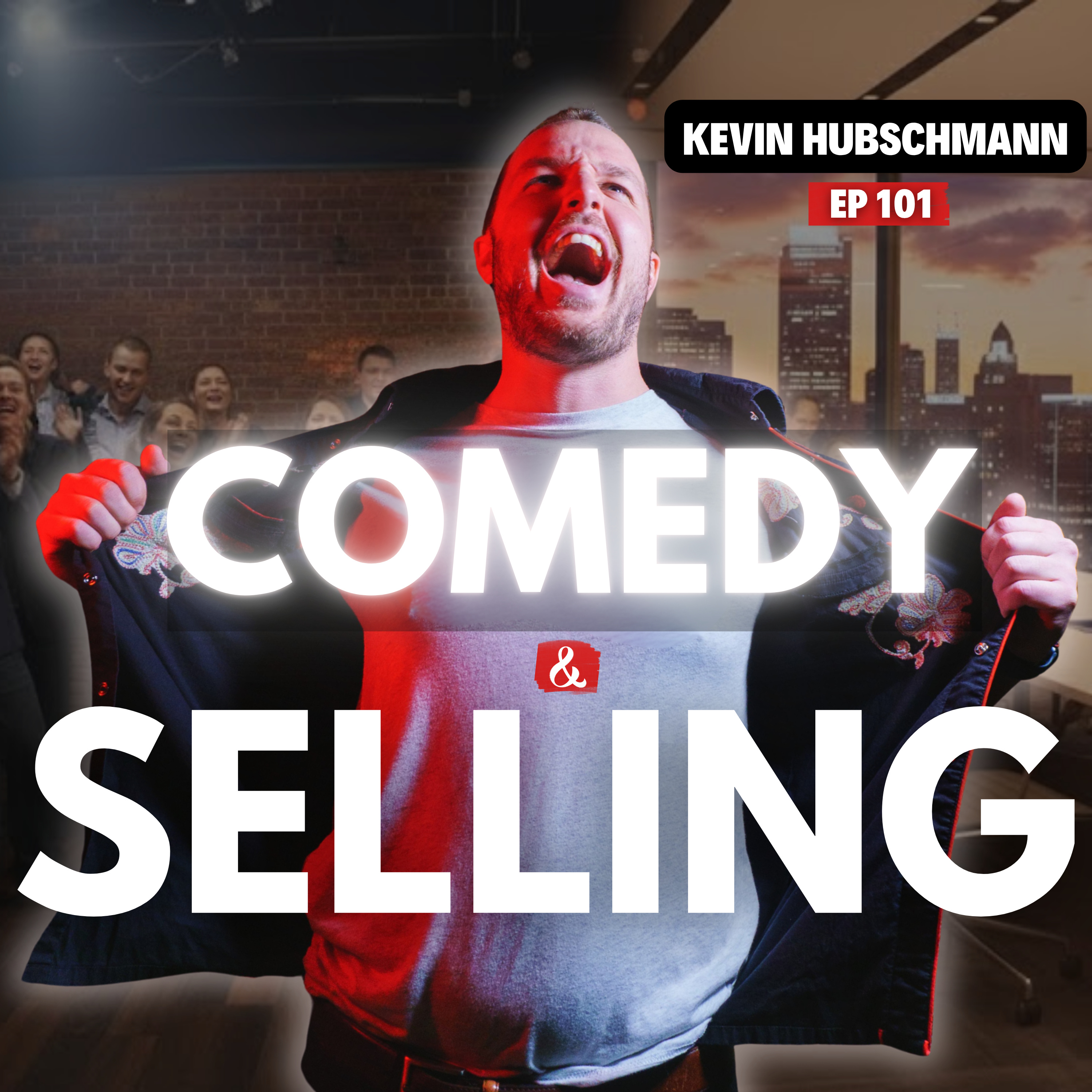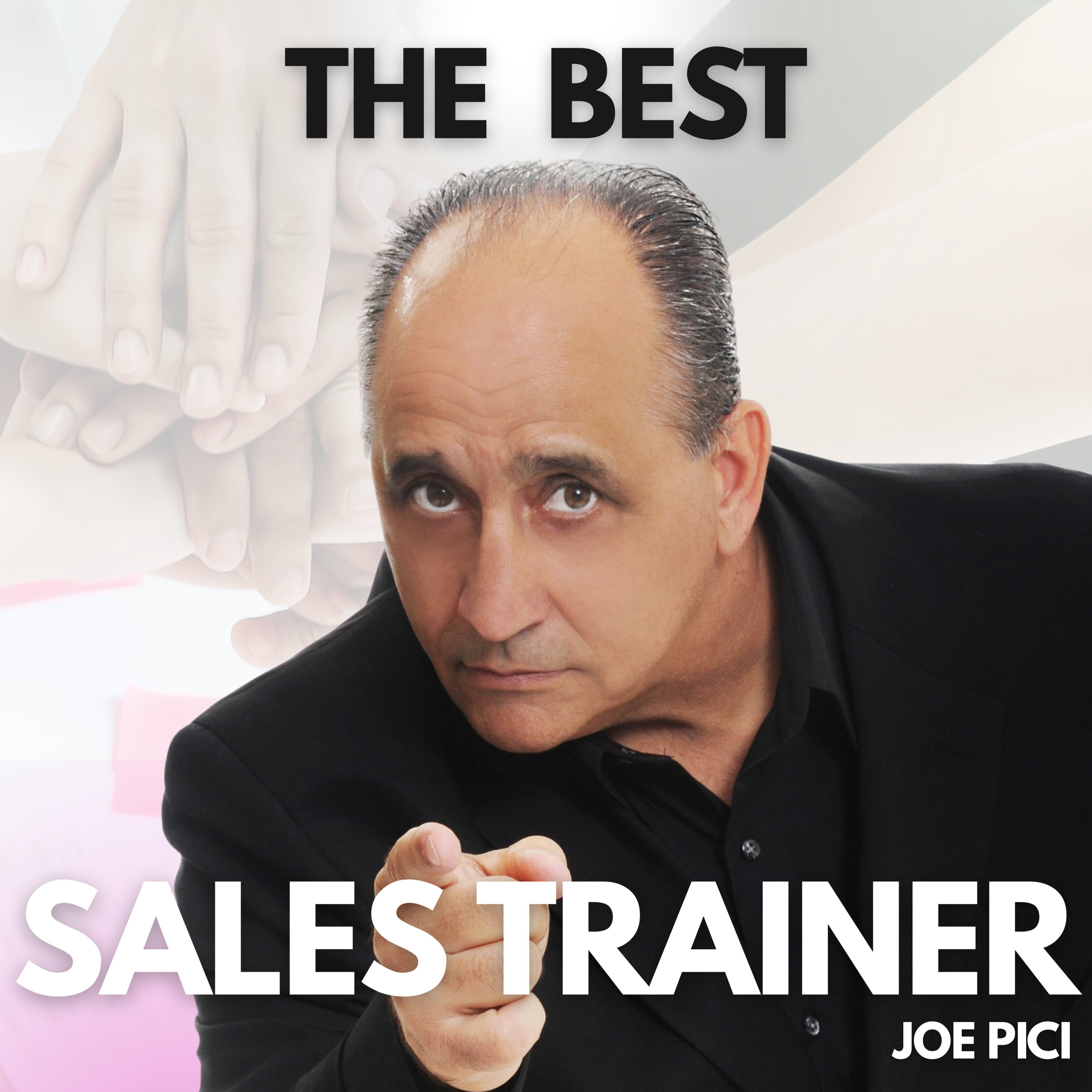
In this conversation, Paul Leon and Joe Pici delve into sales training, management, and the evolving sales landscape in a technology-driven world. Joe shares his extensive experience in sales training, emphasizing the importance of consultative selling, adequate follow-up, and the human element in sales, with a focus on having a strategic process. Together, we discussed the challenges of managing sales teams and the necessity of continuous training. Additionally, Joe highlights key traits that successful salespeople should possess and offers insights into the future of sales amid the rise of AI so sales managers may have an unfair advantage over their competition.
Summary
In this conversation, Paul Leon and Joe Pici delve into sales training, management, and the evolving sales landscape in a technology-driven world. Joe shares his extensive experience in sales training, emphasizing the importance of consultative selling, adequate follow-up, and the human element in sales, with a focus on having a strategic process. Together, we discussed the challenges of managing sales teams and the necessity of continuous training. Additionally, Joe highlights key traits that successful salespeople should possess and offers insights into the future of sales amid the rise of AI so sales managers may have an unfair advantage over their competition.
Hit play, take notes, and let the wins begin.
Takeaways
-
Training should focus on practical skills, such as making phone calls and attending meetings.
-
Consultative sales require understanding client needs through conversation.
-
Accountability in sales management is crucial without micromanaging.
-
A good sales process can help navigate emotional ups and downs.
-
Persistence and humility are key traits for successful salespeople.
-
Sales training should be application-based for better retention.
-
Follow-up is essential; most sales professionals fail to do it.
-
AI cannot replace the human element in consultative sales.
-
Sales managers need to develop a solid sales strategy.
-
Sales success is measurable and quantifiable.
Chapters
00:00 A Free Gift From Joe Pici
01:17 Meet Joe Pici, The Best Sales Trainer
03:50 Sales Management Skills in a Tech-Driven World
06:54 Understanding Sales Processes
09:31 The Importance of Follow-Up in Sales
11:47 The Evolution of Phone Communication in Sales
13:23 Timeless Principles of Sales
16:51 Consultative Sales vs. Transactional Sales
20:02 Navigating the Landscape of Transactional Sales
21:30 The Importance of Training in Sales
22:43 Cadence of Training: Keeping Skills Sharp
24:38 Key Traits of Successful Salespeople
28:20 The Power of Persistence and Humility
29:24 Transforming Underperformers: A Case Study
31:06 Measuring Success in Sales
34:10 Daily Habits for Sales Success
37:47 Excitement in Sales: Overcoming Challenges
40:18 The Invitation to Learn and Grow
Follow Joe Pici
Joe Pici (00:00)
I have a gift. take your phone out. And you go into the message box and type in the word sales edge, S a L E S E D G E.
Sales Edge, one word. If it breaks it up, put quotes around it and send it to 59925. Text it to 59925. Now, as soon as you send it, a link is going to come up for Pici and Pici. If you will hit the link, There is a free 40-minute sales training
I'm also going to offer you a free cup of Joe. That means if you call me at 407-947-2590, you can ask me any question the third thing I'm going to do is I'm going to recommend you look into our website.
Paul Leon (00:35)
I like that a lot.
Joe Pici (00:46)
pici.com. Our three-day sales bootcamp is in October 27, 28, 29. Anybody who's watching this show and says, I saw you Paul Leon's show, I will give you a $500 discount for that three-day bootcamp. It's ranked number one in the world. Also, I have a three-day bootcamp on the business of speaking, training, coaching, consulting.
anybody that calls me up or emails me and says, saw you on Paul's show, I will give you a $500 discount. get that cup of Joe. Let's have a conversation.
Paul Leon (01:22)
for those who don't know Joe Pici, he's been in training, creating content, keynoting on sales for over 40 years. He's the CEO and co founder of Pici and Pici, Inc. a firm he specializes in tactical sales with his wife Dawn,
And since data and experience tell the best story, I think that's a big indicator of proof. Your success includes training, keynote and consulting with the National Football League, McDonald's, Nationwide Insurance, R &R Tires. One of the things you're very well known for is your three day selling bootcamp Rapport Mastery which has been ranked number one in sales training by global gurus for four years.
a row where you help new and seasoned salespeople learn to leverage the skill of mastering sales behavior styles Which go into closing? You're selling scripts yielded a consistent result of 75 to 90 percent conversion rate of converting leads and cold calls to quality appointments to maximize closing sales,
largest keynote you've ever done out of many keynotes is 50,000 people and in one year you actually trained over a million people. I feel makes you very different since I've known you since I was 18.
is I'll never forget, there was a time when I had first, it was kind of like a forced situation as sales. And I remember there were so many sales gurus at the time who when you contacted them, it was like going through so many layers and it became very painful.
just to like, can I talk to anybody kind of feeling, know, like kind of like a weird customer service story that everybody has. And what I liked about you was you had picked up the phone at the second dial it was baffling. And even though this was over 20 years ago,
It's still remember that moment because I was walking around the Sawgrass mall doing cold contacting getting thrown out of retail stores in the Sawgrass mall in Florida, thinking, who is this guy? And since then, 20 years later, still know you still value. I consider you a strong reference point for the successes I've had today in my sales career training, as well as many other areas in my life. You've been a very influential to me.
Joe Pici (03:39)
I don't even know who you're talking about there. was, was, couldn't wait to find out who this guy was.
Paul Leon (03:41)
I'm
your vision and perspective on the landscape and subject matter of sales can get lost in translation And I think that's a mistake for a lot of companies and a lot of sales professionals who are new or as they say Sales senseis. my first question.
what skills do sales managers need to focus on when training their team in a time where it feels like technology is really the priority, not the team on many different occasions when you see news headlines and everything. Could you speak to that
Joe Pici (04:21)
besides training, coaching and speaking, I also act as a fractional sales manager for companies. And so I really have a list of the things that I work on with the sales people I work on. So I'm going to put my glasses on here and I hate to read it, but I got it right here. Number one, a good sales manager needs to develop the sales strategy. They have to have a great process because process.
Paul Leon (04:28)
Okay.
No, you're good.
Joe Pici (04:48)
will trump emotion. So whether you're having a good day or bad day, or you've had a major setback, a process can get you through that. The second thing is they've got to optimize and manage that sales process. So that sales process needs to be able to go if you're dealing with a franchise or a company with multiple places, it needs to transcend all of that and go through all of the units of the company.
The third thing is they need to manage and most people don't like this part. Manage and hold sales teams accountable without micromanaging them so you don't run them off. We're dealing in an environment today where if you say the wrong thing, people walk out. If you look at somebody cross-eyed, they walk out. So how do you manage this new frontier in sales and hold people accountable?
That's a skill set and a strategy that has to be employed. Now, they need to train and mentor the sales team. And I believe 80 % of that training needs to be in skills, picking up the phone, doing a great sales meeting, whether it's live, virtual, a group, all the negotiation skills, lead generation. They need to oversee the lead generation and conversion strategy.
Paul Leon (05:49)
Okay.
Joe Pici (06:12)
They also need to set KPIs, key performance indicators and track the team performance. That manager also has to be able to report what's going on to the leadership of the company. They need to provide insights on budgeting, sales strategy, and scaling. And one more thing, they need to institute and carry out
Paul Leon (06:30)
Right.
Joe Pici (06:38)
priority and time management. I think those are the roles they need to wear in managing a good sales team.
Paul Leon (06:45)
So you talked about process,
People say it, managers say it, sales trainers say it. And I feel sometimes even in my own training, there are people who kind of overuse that word process and you hit on a lot of key nuggets there. But what I'm trying to try to unfold a little more and kind of peel back that onion is
What's the worst process you've seen that you're like, man, we need to do the opposite of this entirely.
Joe Pici (07:10)
bad process is no process at all. And you would be shocked. How many companies don't have a process? I've been with CEOs, CFOs, directors of sales, VPs of sales, and I'll hand them a marker and there'll be a whiteboard and I'll say, draw out your sales process. About 85 % of them do not have one. What a good process is.
Paul Leon (07:13)
Yeah.
Really.
Joe Pici (07:33)
is step one, how do you generate your leads? Step two, how do you contact those leads? How do you reach out to those leads? Step three, when you get them on the phone, can you get them to a formal meeting? All right, then can you do a quality, what we call a course story, you might call a sales meeting,
Paul Leon (07:50)
Right.
Joe Pici (07:58)
It's all one in the same, very consultative in nature. Then what happens after that? For us, our processes, we either go to proposal or we don't. At that point starts the world of follow-up. Do you know, Paul? You'll know this because you're an avid reader and a studier of the industry. 92 % of sales professionals never follow up.
follow up, follow up, follow up to convert it into a sale. And then you go to contract, you get a deposit and then you execute and then you stay in touch with the client. So that's our process.
Paul Leon (08:31)
Right.
You said some key things there that I totally align with. Follow up, follow up, follow up. it's really interesting that you see CEOs not being able to easily, and it sounds like, correct me if I'm wrong, easily be able to take that marker and go, here's our process, and be able to write it rapidly.
And then you said another thing that's really important, and I think a lot of people may miss this, is you said, do we contact them? And I'm going to tell you why I feel that's an important variable in this conversation between you and I, Joe.
I see personally and I read going through an MBA program the importance more on marketing and creating the inbound lead all this fancy marketing speak. And this goes back to as old as the book's been selling by Neil Rackham where he says there's great divide that marketing people typically focus on how to just create the inbound effect.
I feel there's a gap there that it's reversed, where people fall into the trap of focusing just on the marketing to create the inbound experience, because one, they feel it's easier. Two, I think there's a fear variable, maybe you can validate whether it's true or not, and those are the two key things I see.
What else do you think is there outside of what I said or am I spot on?
Joe Pici (09:55)
No, you're on, you're on. Let's face it. Marketing costs you money. Sales makes you money. And I think, and that's, mean, that's just a Joe-ism, but it's, it's a fact. There's an inbound sales approach where they throw tons of money at marketing. I was coaching a client this morning before we got on and we were talking about why do marketing companies get fired? Well, it's not only because they don't get the phone to ring or they don't get inbound leads.
Paul Leon (10:00)
Okay.
Right.
Joe Pici (10:22)
because nobody converts. So whether it's an inbound lead, an inbound approach or an outbound approach, outbound is always going to be harder. It is always going to be harder. And I like the phone as the initial outreach. Outbound sales, there's a 92 % turnover annually in outbound sales.
So if you're going to throw money at marketing and get that phone ring or get people to lead, you better have people that respond rapidly. 75 % of inbound leads never get contacted. 96 % of the time, if a person gets an inbound lead and they respond within 30 minutes, they will get the business.
That's why I answer my own phone. when you're looking at inbound leads coming from marketing, you're going to have to have a big budget. But whether it's inbound sales or outbound sales, they're going to have to master certain skills and they're going to have to master certain strategies and they're going to have to master messaging.
Paul Leon (11:25)
My son, he's nine And we were, was taking on the daycare and he's like, I want a phone. want a phone. He's been talking about this all the time. Like, dude, you're nine. What do need a phone for? tell me what the phone is. And he goes, well, I can play games on it.
Joe Pici (11:39)
Yep.
Paul Leon (11:40)
I can text.
I can play Minecraft.
you used to have a roll of quarters and you would go to a pay phone. I don't mean this to try to highlight your age in a negative way, but I want to highlight it in a positive way. And the positive thing is you have seen a lot of transition and a lot of training. The phone was this and now it's become this.
Joe Pici (11:48)
I'm old. ⁓
Paul Leon (12:00)
the phone has changed so much.
Why has the phone changed so much to the point where it almost feels it's becoming more personal? And how do we get back to the fundamentals of contacting people?
Joe Pici (12:15)
what we're known for, is our live outbound telephone call training. And invariably people will say the phone is dead, the phone is really not for use, but yet, whether it's corporate training, one-on-one coaching, or our sales training bootcamp,
During the training, we make live outbound calls. We've never done less than 74 % conversion to appointment. We do 92%. We navigate the gatekeeper. We literally will get the same day, 45 to 50 return phone calls. That's all messaging. In a high tech world, high touch is the difference. I know all about AI and AI this and AI that, and I am not an AI specialist. Well, what I do know...
Paul Leon (12:52)
Okay, I like that.
you
Joe Pici (13:00)
is how much business is being lost right now because companies are misusing it. Nothing will replace the human element. So I do believe this, when Sam Walton was alive, he had a board and whatever the board voted on, he did the opposite. In my coaching this morning, this gentleman said, Joe, how do you use LinkedIn? I literally went on LinkedIn.
send out an invite to somebody, they connected with me, I picked up the phone and called that person and we immediately went to a meeting. He says, how come this works? there's principles and practices. Practices are the flip phone turned into the iPhone.
Paul Leon (13:32)
I
Right.
Joe Pici (13:43)
The
iPhone 1 is now the iPhone 15 or whatever. That's a practice. Principles are people still resonate with the human element. And so we're never going to throw that away.
Paul Leon (13:48)
Right. Yeah.
Can we say principles are timeless laws of sales. Is that a fair way to frame that statement? I think definitions are very, very important about mastering messaging. And to me, I think part of that is defining the words we say so that people know the game we're playing so they can be invited.
Joe Pici (14:01)
It's well-stayed.
Paul Leon (14:17)
easily and I think that's the big thing about sales I've learned from you and from a lot of gurus
Sales is about making it super easy for people to buy. So that might be one timeless law of sales. Can you talk to me on what other laws are important around sales that we need to not lose ourself? You mentioned some key things like we're losing ourself to AI. We're losing money because we're focusing on practices via technological advances. Can you speak to any other laws as well
Joe Pici (14:49)
I think AI may work with transactional sales. Transactional sales is get to yes or no as quickly as possible. When it comes to consultative sales, you're talking about discovery. You're talking about interviewing the potential client. You're talking about finding out what their concerns are, what areas they want to improve, what they want to accomplish, what is their timeline.
Paul Leon (14:53)
Okay.
Joe Pici (15:15)
That is a conversation that is not a robotic thing where it's transactional.
let's look at who has the money in the United States of America today. The majority of the money in our country today is in the baby boomer into the age group.
Paul Leon (15:24)
Sure, good.
Joe Pici (15:31)
and the baby boomers, some of the baby boomers are using traditional fax machines. they they are learning AI, but they're fighting it a little bit and they're really wanting to do business with a human being.
And so therefore when you're selling The average sale takes six to eight to 15 touch points. And I don't mean touch points like that cold call you get from an AI dialer. I'm talking about a conversation of some sort.
Paul Leon (16:00)
Yeah.
Joe Pici (16:05)
before it'll close. So I'm still of the belief that there is a lot of need for that personal touch, although people of my generation have to learn to sell to the millennial, to the other generations.
Paul Leon (16:16)
Right.
I really appreciate the fact of how you were humble enough to say we need to learn technology on some level too.
Joe Pici (16:29)
After.
Paul Leon (16:30)
had a 360 review done on me.
And in that three six year review, came back high. But the point of a three six year review is to find areas of opportunity to grow. I mean, that's just the way it works. And one of the things that came out of it was like, Paul, you need to be better at systems thinking. And that's a big thing in corporate systems thinking scaling. think sometimes the trap that we can fall into is we focus a lot on scaling to earlier systems thinking.
it's hard to scale consultative sales, like a toilet paper that's like five bucks. Obviously you have to use technology. I'm going to frame it like this. is there a price point in your opinion that consultative sales really matters Number one, number two,
When should a company flip flop between systems thinking, scaling and consultative selling thinking?
Joe Pici (17:24)
that's an MBA question right there. that question, but I think number one depends on what you're selling. If you're selling a widget, I don't care if you're selling a widget to a major company, that's a, that's a pretty black and white and that can be scaled. And they probably would like you to scale that. They probably would like this to be a fast one.
Paul Leon (17:30)
that's fair.
Yeah.
Joe Pici (17:45)
And
a lot of times when you're selling a widget, it's going to come down to price. When you're selling, whether it's consultation, whether it's a training, whether it's a major build out, you know, this is a consultative sale and you're not going to be able to automate that. Because you're dealing with layers when you're selling at the corporate level. So in our business.
Paul Leon (17:50)
Okay.
Joe Pici (18:10)
Our target market is small, medium and large companies and individuals. I've got to know who I'm selling to and what I'm selling them. so therefore the more layers I have to go through to sell, let's say a bigger corporate level, each layer is a consultative sale to see if they move me up the ladder. Because what we sell
Paul Leon (18:28)
Right.
Joe Pici (18:34)
is not a widget and because most of the clients we have are not into widget sales then we are very much consultative and so you're not looking for that transactional thing and and I know companies now are scratching their head on how much technology should they have in their process of sales and account management and so some of them
Paul Leon (18:36)
Yeah.
Right.
Right.
Joe Pici (19:02)
have laid off a ton of people and turned it over to AI and I think some of them are jumping the gun.
Paul Leon (19:10)
Why are they jumping the gun?
Joe Pici (19:12)
strictly financial. don't cost what people cost. Machines don't get sick, don't get pregnant, don't need time off, don't come in late. And so all the issues they've had with quote unquote people, they think it's going to be resolved. People want to do business with people.
Paul Leon (19:13)
It's strictly financial.
Okay.
Joe Pici (19:36)
That's a principle. A practice is how do we infuse it here at Pici & Pici? How are we using AI? We're using AI for research. That's what we use AI for. when it comes to touching a client, past, present or future, we're not we're not using it.
Paul Leon (19:36)
Right. Right.
Okay. Fair enough.
Have you ever seen somebody who had a model that was an efficiency type product, but we're consultative sales did actually benefit that person, even though the trap would be I have a widget, the widget costs $10. it's very transactional. Have you ever seen in your experience, a situation where actually consultative sales did benefit this person? And here's why
Joe Pici (20:21)
what comes down to who am I selling this product to? do they want to be dealt with consultatively? And also you could be selling toilet paper, but if you're selling a half a million dollars worth of toilet paper, it's probably not a transactional sale.
Paul Leon (20:28)
Right.
Gotcha.
Joe Pici (20:39)
Okay,
you know transactional sales are you know when you get those calls from from a robot and They're hitting a dialer and if you make the mistake of saying Yes, I want information. It goes to a real person or it doesn't I spent so much time on the phone. I know immediately if I'm talking to a human being or not
If I'm talking to a human being, they're going to get the first base. If I'm talking to a machine, I don't have time for that because my time is valuable, just like your time is valuable.
Paul Leon (21:10)
absolutely.
I think it's interesting because now what I'm seeing script wise that's working is like double dialing to get around AI because what people are doing, I learned recently in MBA program is that people are letting it go to voicemail more. So a good voicemail script that I'm always trying to recommend in any training I do is like, and I'll just say it out loud is this Paul 407-49662-407-49662-40 state the reason or prop for the call or
pitch.
And then, Hey, call me you can 407-496 and I'll leave that my number twice. I'll hang up and then I'll call again. So the person sees the same number and what people are seeing now is that's working to get a kind of around AI because there's just, it's flooded the markets so much.
I think universally companies most people are going to value training. I don't think anybody's going to look at that and be like, that's a dumb idea not to train. But what is a good cadence of training? How often should we be training? And is it daily? it weekly? Is it monthly? Because there's again,
They'll quote of, if I get too comfortable, then results could stand still kind of perspective. Can you kind of speak to a good cadence of training to keep us on the edge so we don't lose the human sales high?
Joe Pici (22:28)
Absolutely Paul
first of all, you've been in the corporate market now and you're with a company that values training but I'm going to tell you there's a lot of companies out there that don't want to invest in training because they actually believe if they train someone and that person leaves they've lost money but Zig Ziglar says but what if you don't train them and they stay? All right so there's a lot of companies out there that
don't want to train. And then underneath that, a lot of times, especially in sales, people take their top performer, make them a sales manager and think they're supposed to be great trainers. They didn't get that skill set. They were great players. They're not great coaches. far as cadence, I think cadence has to do with what exactly you're training. If I had a company,
Paul Leon (22:56)
Yeah, it's a good one.
Okay, fair.
Joe Pici (23:21)
I would make sure every other month they were getting communications training and every other month they were getting sales training, processes, skills, messaging, and it would be application based. And what I mean by application based, like in our training, in our sales bootcamp, application training is we're going to do the hardest part of sales, which we're going to make live outbound calls. Everybody in the room is going to make calls.
for about almost two hours. So they're applying what they're learning. So back to that, I believe once a month is good training, but I believe it better be application-based, because if you're going to pull people out of the field and train them, they better be doing something that's going to be proactive.
Paul Leon (23:57)
Right.
So you said earlier 92 % turnover in outbound sales. if I understand the data point correctly, only the only have an 8 % stick rate of people who, who stay. And I've actually heard even in my own world and you can say Generac I don't care. That's a good company.
I had one time somebody say to me, it takes a special person to work commission free for a company an authentic moment. we're just having lunch together. And he's like, it's just it's so hard, So let me ask you this. You undoubtedly have seen a lot of different trainings. And undoubtedly, there are going to be people who vote out or they
They just don't want to do it. I believe in free will, do what you want. But at some point there has to be some key behaviors that that person should have or know to be successful in outbound sales or to be successful in a sales period. Could you speak to that a little bit what I've seen the best type of salesperson has Paul is this, this, this, and this. And I've seen situations where
I could pretty much call it just because I've trained so many people.
Joe Pici (25:23)
I think the mistake people make is they try to hire talented people.
Paul Leon (25:28)
mean by that? They try to hire talented people.
Joe Pici (25:30)
people that have the talent for selling that they they are talented that doesn't always mean they're going to be great at sales in your company i believe you hire ambition self-discipline and character and you train processes and skills that's what i truly believe if a person doesn't have that pilot light doesn't have fire in their belly if they're not looking to
really get after it so to speak. If they don't have self-discipline, keeping a schedule, if they're late all the time, if they don't have the ability to say no to things that are not highly productive, and if they don't have solid moral character, But then, are they humble enough to learn
I've got a guy who comes to our training. He's been selling in medical sales for 35 years. He's been to our last four sales training boot camps he said he had gotten lazy and lost his skill and strategy for the phone. And so he wanted to relearn it and refocus on it. And so I have seen
Paul Leon (26:28)
Really?
Really.
Joe Pici (26:46)
Hundreds of thousands of sales professionals hundreds and thousands of them, but when I think about sales professionals I also think of that entrepreneur that small business owner who's responsible for bringing in business to his own company he's in sales and Yet he thinks his business is about a website. He thinks his business is about the product The only thing that makes you money in business is sales
Paul Leon (26:55)
Okay.
Yeah? Correct.
Joe Pici (27:11)
And yet, companies will train their people in other areas, but they won't put enough emphasis on sales.
Paul Leon (27:19)
that is one strong suit about Generac They do a good job, I feel, leaning into that principle.
I used to be a president of a Toastmasters club and I remember when I became president I tried to be very democratic who wants to be the timekeeper? Who wants to this role? And it was with a of these engineers from NASA and they all got mad at me
Why don't you just tell us what to do? And I was like, wait a minute. And I was like, I was trying to be friendly and they got irritated and I was like, fine, then you do this and you do that and you do this. And they became instantly happy that I just prescribed the statements, the key roles as part of the system, like an assembly line. I think about that experience and I think about your experience.
You have to have some pretty powerful influences. I feel to have the level of achievements you have. That's just my my belief. So let me ask you this. What are some key statements, some quotes, some things over the years, because you mentioned Zig Ziglar that have stayed with you through all your training and learning that you feel that, Paul, these key statements have always helped me to achieve these results. And if I could transfer the skill of what these timeless statements are to other people,
it would start to give them the edge. So instead of a 92 % turnover rate, maybe it's 90 % because 2 % could be a lot in sales.
Joe Pici (28:41)
Well, it
is greatly a lot. And I will tell you this. You're not going to see the 8 % not being trained and not opening up to training. The people who make it in outbound sales are hungry, humble, and persistent. That's a quote. I don't remember who said it, but I thought that person is dead on.
and persistent. Persistence is something you cannot manufacture. Training doesn't make a person persistent. Humility is the ability to want to learn. You've always been that one. In fact, you fit the hungry, humble, persistent model. And that's why when you were 18 years old, I would spend time with you. I would drive to South Florida. We would sit at Barnes and Noble.
Paul Leon (29:07)
Yeah.
That's fair.
Joe Pici (29:33)
We would drink rotten coffee and just talk because you had those three ingredients your whole life. And that was something that had been instilled into you. And you're not going to tear, I've never seen anyone slow play into ambition. If a person comes to the table and they're lazy, there's nothing you can do with that person. I was sitting with a vice president of sales.
Paul Leon (29:51)
That's true.
Joe Pici (30:00)
and we were talking about whether or not they should train their people. I took him through my consultative meeting and he said, well, I just don't know what to do. I said, well, here's the deal. You either fix them or fire them.
Paul Leon (30:12)
you
Joe Pici (30:12)
Right?
Either train them and get them better. You know, in my fractional sales management role that, I'll go into companies and I'll work on contract basis or whatever. I took this one outside sales rep that they were getting ready to fire and they sell hoses and clamps at the big commercial level. And the most this guy ever did in the whole month was $20,000.
Paul Leon (30:32)
All right.
Joe Pici (30:37)
And his quota was 30,000. So he was at the end of his rope. They were getting ready to cut him. I said, give me a, give me a month with this guy. And then if you want to fire him, fire him. Well, after two weeks, he had done $42,000. Okay. yeah. We doubled his best month, but we double in two weeks. Well, what did I do? Well, I go back to this document. I developed a strategy. I gave him a great sales process.
Paul Leon (30:45)
All right.
Really?
Joe Pici (31:01)
I managed him and I set up an accountability program for him that I wasn't micromanaging him. The process was managing him. I trained him. I mentored him. I tracked his performance. We really evaluated his leads. And then I would report what was going on. And I really had to work with him on priority and time management because he was spending a lot of time in the wrong places.
sales is the easiest thing to quantify.
A person who is selling, when people say they're great at sales, I ask them this question, are you hitting your numbers? Well, no, you're not great at sales. It's not like leadership development. It's not like marketing. It's not like human behavior. mean, it's sales measures out quickly. You either get it done or you don't get it done.
Paul Leon (31:49)
Yeah, have fun.
It's a powerful story you talked about that took 14 days, two weeks, maybe just 10 days if you don't count the weekend to turn someone that quickly. think there's a lot of specialty and skills that, because you can't learn everything in a book, like even through like my MBA program. It's a lot of good stuff, but sometimes I'll go into class and I'll be like, well, this is what the real world says. And they're like, I never knew that. You know what I mean?
Joe Pici (32:22)
This is we
also have to understand something about books. Books are great. But in my industry in the quote unquote sales training world, over 90 % of people who write sales books don't sell. Now, they're great authors in their great they're better writers than me. I mean, we wrote a book, it was the best sell yadda yadda, but they're great writers. And people love them. And they
Paul Leon (32:30)
Right.
Yeah.
you
Joe Pici (32:50)
They get to be celebrities. Some of them get to be celebrities. But are they really in the hunt? I'll give you an example. last night on our sell more virtually, we have a membership platform every Thursday night. I'm out there live, a master training, master coaching. And the whole concept of last night's training was from a quote from Willie Jolly, A setback.
is a set up for a comeback. I was in a hospital for a couple of weeks. It's not important. on June 1st, I had the rock and roll buddy. Well, from June 1st until this moment, I got 75 formal proposals out. That's a lot. that's a lot. It's formal proposals. That's not meetings. That's not phone calls.
Paul Leon (33:24)
Yeah.
Joe Pici (33:33)
Proposals that may go to contract well I can measure that I can look at that board because I have whiteboards all over my whole office and I can go I'm at 75 and then when one goes to contract I get a deposit I circle it I can count that
Paul Leon (33:41)
All right.
a key behavior a salesperson needs to have is knowing their numbers back to front, front to back. There was one study I saw in my MBA The salespeople who were the most successful were the ones that had the most hours available to the client.
And I feel like that's something that's just common sense. But as you know, another good saying that I live by is common sense is not always common.
When I first got into sales a long time ago, I was going door to door in Miami, Florida, selling corporate gym memberships. I'll never forget. There was this one time I called you and there was this speaker I was listening to and you had mentioned celebrity speaker and he was like a big time guy. And he had said, if you're not reading five books a week, you're not in sales and I'll never forget. You're not going to remember this story. In fact, it's crazy. I still remember this. It just came to me. I called you up.
And it was like nine o'clock at night and I'd been selling all day. You had been selling all day. And I was like, Hey, this guy said you got to read books a week. You're not good in sales. And you're like, Paul, it's late. He should probably just get off his butt and go sell good night. And that's he said to me. And you hung up the phone All right, that's fair. I say that story to kind of lean into I think sometimes salespeople getting to learn helplessness.
I think that's a real thing where it's like you get over analytical, but you do have to know your numbers, you have to be available to the client. What else in there is something that is important?
Joe Pici (35:17)
when all is said and done, is said than done. When all is said and done, more is said than done. Most salespeople don't work as hard as they think they do, or they tell their boss, or they
Paul Leon (35:19)
Say that again, because I it was really, really good. We just said, that one more time.
I like that.
Joe Pici (35:33)
Owners of business. Here's something I will tell you. There are certain things that you better measure if you're going to be successful as an entrepreneur, business owner, or you're going to be a professional salesperson. You have better have a big funnel and a big way of generating quality leads in your target market. That's essential to measure and to focus on. Number two, you had better do and measure how many outbound reaches you do.
Paul Leon (35:44)
Yeah.
Joe Pici (36:02)
In other words, how many people you're calling, email marketing is great, whatever, but how many ways you're reaching out to potential clients. You better have a way and this next one is a non-negotiable. How many formal sales meetings or what we call core stories are you doing every single month? Every single month. How many quality sales meetings are you doing?
Then how many proposals are going out? Then how many contracts are you getting? If you just measure those five things and stay focused on those five things, you will not have enough time to read five books a week. And that was my point that night. I don't know where to find time to read five books a week. here at Pici and Pici, I do all the training. I do all the selling.
Paul Leon (36:45)
You
No, I'm with you. I agree.
Joe Pici (36:58)
I'm so glad for podcasts and I'm so glad that I can, I can listen to a podcast. When I'm driving somewhere because I don't have time and books are great. People that are writing books are great. People are less likely to read today than they are to listen to a podcast that is industry specific because they can be doing something else. When I read a book, I got a highlighter.
Paul Leon (37:18)
Right. Yeah.
Joe Pici (37:22)
You know, I'm trying to get every nugget out of it.
Paul Leon (37:26)
You know,
You've gone from strength coach at Liberty University. I remember one of the CDs has crazy to think about Joe. You used to have this CD called Burn the Boats. I don't know if you remember this CD or not.
Joe Pici (37:40)
I remember it.
I remember it.
Paul Leon (37:42)
I remember that I was like struggling in sales, kind of like that guy who was not hitting his number. I was not hitting my numbers. And I remember I used to listen to a CD every time I got a rejection and my first month was like a nightmare.
I think the first 30 days of sales in my experience, it's like the nightmare timeline. I feel like if people can give consistency to 60 days and they use your practices we talked about and they can leverage from your training, I think they're gonna save years of mistakes. I would say arguably 20, 30 years of mistakes.
What are you excited about these days about sales despite the fear around AI despite all of that? What is on the horizon that if people do leverage these skills? Here's where they can rise above it. What excites you
Joe Pici (38:37)
what excites me is that Whether it's our corporate training, one-on-one coaching or our bootcamp. We train intensely for two days, high intensity training, messaging, lead generation, core stories, intense value propositions. But then the day comes that they have to make phone
Whether it's corporate training, whether it's one-on-one coaching, I've got a next week will be in here from Texas, I'll be coaching him one-on-one or a boot camp. On the third day there's coffee and Danish and everything. They come in, they don't touch any of the food. They're nervous
And they're going to have to make calls. have to bring 50 to a hundred names and numbers that they've never done business with. They're a little on edge and I spread them out so it doesn't sound like telemarketing. It's not like a boiler room. And then they start. And then all of a sudden they start getting traction and all of a sudden their entire mood changes. the shyest person in the room.
Paul Leon (39:27)
Yeah.
Joe Pici (39:40)
starts getting traction and they start writing the results on the board. And after two hours, I bring them back in and we're going to now we're going to talk about it. We're going to really let it off. What did you learn from this experience? What did you learn about yourself? And 90 % of the time is this was not hard, Joe. I got Joe, I booked an appointment with somebody I've been chasing on email for two years and they win.
Paul Leon (40:02)
you
Joe Pici (40:10)
They score. At our last boot camp, we closed $1.2 million in real money on day three because the phone call actually went through the gatekeeper to the decision maker and they did business. That's what has always given me such incredible excitement and joy to watch people beat the hardest part of sales.
Paul Leon (40:35)
Why does that excite you so much? Because there's so many sales trainers I've seen fizzle out who train through intimidation. Like you're not as good as me. And what I like about you personally is you train through invitation, intelligence is about invitation. Your training is very inviting.
And yeah, there's gonna be an investment, but you make sure people get their money back in skills. Why does that excite you when there's a lot of different sales trainers out there who are more interested in donuts and intimidation? nothing wrong with eating a donut, but I'm just being sincere with you. I'm just, it's very interesting feeling of why you get excited about this.
Joe Pici (41:08)
Number one,
Number one, I don't believe in intimidation. I'm like you, you know, I don't talk people into my training. I don't use some closing technique. I don't use neuro-linguistic programming to get them to come to see me. They know exactly what they're coming for and why they're coming. They're coming. And you said the best thing. Invitation. They make a decision to hire me.
here's the other thing, and this is not a yay Joe thing. I'm still in the game. I'm still selling. And because I'm still selling, I'm living with them. I know what they're going through. I know what they're hearing on the other end of the phone. Yesterday, I made 75 phone calls. I get the no's. I get the no answers. I get the whatevers. at the end of the day, if I ever stop selling, I will stop.
doing sales training salespeople can spot a phony a mile away and if you're not selling you've lost relevance in a good salesperson's eyes.
Paul Leon (42:08)
Yeah.

CEO of Pici and Pici, Inc.
Joe Pici—ranked among Global Gurus’ Top 30 Sales Trainers—is the strategist behind Rapport Mastery™, the results-driven sales system he co-created at Pici & Pici Inc. Since 1992, he has coached teams and top producers to reach decision-makers, book more appointments, and close deals through live phone-call workshops.
As COO and co-founder of Pici & Pici and co-author of Sell Naked on the Phone, Joe distills three decades of front-line experience into a turnkey framework that:
• Increases appointment setting
• Boosts close rates
• Secures repeat business and loyalty
• Elevates communication skills
• Provides clear direction for sustainable growth
Whether you’re an individual representative or a Fortune 500 team, Joe’s Rapport Mastery training delivers measurable, fast ROI.






















